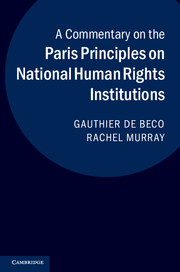Book contents
- Frontmatter
- Contents
- Foreword
- List of abbreviations
- Part I Background: history and challenges
- 1 Introduction, history and context
- 2 Challenges
- Part II Commentary principle by principle
- Part III Twenty years later: the future of the Paris Principles
- Annex I Principles relating to the status of national institutions (The Paris Principles)
- Annex II ICC General observations as at May 20131
- Bibliography
- Index
- References
2 - Challenges
from Part I - Background: history and challenges
Published online by Cambridge University Press: 05 November 2014
- Frontmatter
- Contents
- Foreword
- List of abbreviations
- Part I Background: history and challenges
- 1 Introduction, history and context
- 2 Challenges
- Part II Commentary principle by principle
- Part III Twenty years later: the future of the Paris Principles
- Annex I Principles relating to the status of national institutions (The Paris Principles)
- Annex II ICC General observations as at May 20131
- Bibliography
- Index
- References
Summary
As noted in the previous chapter, the Paris Principles have reached an elevated status since they were adopted by NHRIs. They are now taken, whether at the national, regional or international level, as the definitive and most widely accepted benchmark against which NHRIs are assessed. Compliance with the provisions is seen as evidence of a credible and independent institution and one which is then used by NHRIs themselves to protect their mandate and work. However, the Paris Principles are not without criticism. They are arguably narrow in their focus, looking primarily at issues affecting the establishment of an NHRI rather than how the NHRI performs in practice. They do not seek to expand on or cover a comprehensive range of issues relevant to the functioning of an NHRI. Further, although compliance with the Paris Principles is seen as evidence of an NHRI’s legitimacy, the relationship between the different actors and stakeholders at the national, regional and international levels is not addressed. Neither do they look at all issues of accountability and effectiveness. Lastly, OPCAT and the CRPD prescribe national mechanisms to be established by States and make express reference to the Paris Principles. Although the Paris Principles have been shown in practice to be pertinent to the establishment of these mechanisms, the requirements set out in these treaties raise additional issues that need further consideration.
- Type
- Chapter
- Information
- Publisher: Cambridge University PressPrint publication year: 2014



